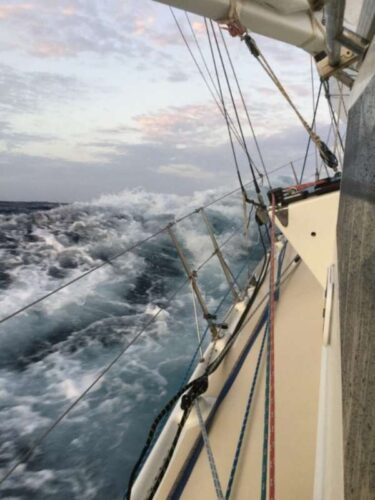Sailing across the Atlantic Ocean is a dream for many. Not the easy way, like on a big cruise ship, but on a sailboat. In places like La Linea in Spain, Gibraltar and the Canary Islands all sorts of people wander the docks in search for a ride. They want to crew on a sailboat.
But what is being crew on a sailboat across the Atlantic really like? And what does it take? This winter my husband and I sailed across from East to West, from Lanzarote, Canary Islands to the Caribbean, more specifically Antigua. We brought with us one crew. While we are fine by ourselves it’s nice to get some extra sleep.

What to expect when you Crew on a Sailboat across the Great Atlantic
I often hear how romantic it must be to be out on the ocean for so long. It’s not. There are moments that are fantastic, but you aren’t sitting on the bow watching a spectacular sunset while dolphins play at your feet most of the time. (It does happen!).
1. You will be tired
One person has to be awake and on watch at all times. Depending on how many people you have on board you will not get a lot of hours of uninterrupted sleep. We did 2 hours on 4 hours off. You may not feel like getting out of your cozy bunk after 4 hours, but you have to. The boat is always moving and noisy, so you might not get the quality of sleep you are used to.
2. You may get seasick
The first few days after leaving the Canary Islands can be a bit rough. Make sure you know if you get seasick or not, and if you do make sure to have a remedy at hand. There are many different ones out there. Try them out before you leave. The good news is, you will get over it. Most everybody does. It may take a few days, though. No one said sailing across the Atlantic is luxurious.
3. You need to lower your hygienic standards
There are several reasons for that. It might be too rough to shower. We did a West to East crossing and had gale or near gale conditions 8 out of 9 days. We each showered one time during the whole trip. Showering slides down your list of priorities if it may mean breaking an arm or a leg in the process.
The boat you are on may not have a water maker. When water is severely limited you may be able to shower only every few days, or not at all.
Be prepared. Bring baby wipes, they are excellent when conditions are too rough to shower. Have a small towel or wash cloth to use when some water is available. Try not to be too judgmental – severe restrictions are part of this lifestyle, whether it is water, electricity or something else.
4. The food may suck
We are lucky enough to have a freezer, but a lot of boats don’t. It’s always easy to throw a frozen meal in the oven and be properly fed. Sometimes conditions do not allow for cooking. You may not get a hot meal for a few days.
5. You will be cut off from the “real world”

While a lot of boats nowadays have some device that allows them to communicate with the outside world, satellite data is very expensive. You may not be able to check your email daily, receive text messages, or check your Facebook.
Roll with it. Take this chance to disconnect. In our crazy world we don’t often get a chance to do that. There’s always pressure to be available, post the next picture on your Facebook or Instagram, know what is going on in the world. Don’t worry about it. The world will continue to turn without you. It’s nice to get a chance to clear your head.
If you do have a way of receiving messages, I strongly urge you to tell your loved ones a few important things. One, if anything bad happens keep it to themselves. You are stuck on a small vessel in the middle of the ocean. There is nothing you can do to help. That’s a very good way to lose your mind. (I’ve seen that in action.) But you can’t. You have to function, because there is a job to do: sail the boat safely to your intended destination. And two, if they do not hear from you do not alert any authorities. Electronics break. Salt water and possibly heat is a bad environment for electronics. If they are used to receiving daily messages from you, and suddenly they don’t they may get nervous. Give them a time frame in which you are most likely to arrive (and let it be a generous one) and if you do not, then they can take action. In any case, you should not be sailing on a boat without an EPIRB, a device that will be deployed and notify the authorities in case of emergency.
What will be expected from you
Be sure to talk to your captain beforehand about what his or her expectations of you are, and what your responsibilities may be. Sailing experience will benefit you the most when trying to find a boat. You would think that part is obvious, but there are all kinds of adventurers out there who want to sail across an ocean yet have never been on a boat.
Almost more important than experience is if your personality matches those of the other people on the boat. You will be stuck in a VERY small space for a long time. It took us 16 days to get across, but we have a fast boat and it will take most boats longer than that. This part is tough.
It’s easy to keep it together for a few hours, maybe even a few days. But eventually you will learn who your crew mates really are. Which can be awful or wonderful. It can lead to an amazing bonding experience, or you may never want to see them again.
Be sure to offer help with all chores, as much as you are capable. Help with the cooking. Most people don’t care if you are a gourmet chef or not, as long as you can produce a hot meal. Help with cleaning. Help with preparations prior to leaving. Be open to learning new things and volunteering even if you don’t feel like it.
The most important thing is, you may be expected to function no matter what. Sailing across the Atlantic is tough. Your crew mates depend on you, and that means you may not be able to stay in your bunk when you feel seasick, or you are tired, or scared or homesick. It doesn’t matter. However, you are presented with an excellent opportunity here.
How this experience may change you

I lived and sailed on my boat for 12 years. I feel like I have grown immensely as a person. Suffering isn’t necessarily a bad thing. You definitely do some of that when sailing. I hate staying up at night. I love going to bed early and getting up early. Being up in the middle of the night and having to function is the worst for me. But I did it, time after time. It’s part of the deal.
I also get seasick. It was bad in the beginning. For 3 days straight I would feel miserable. The only seasickness remedy that helped was Dramanine, which knocked me out. That’s okay if your husband is a captain on a big trawler in Alaska and somehow has superhuman abilities when it comes to staying up and functioning. But if I was needed I couldn’t take drugs, and then I just sat in the cockpit, occasionally puking over the rail.
I learned not to take my suffering too seriously. I asked myself, is it really this bad? And told myself: this too shall pass. In life the ability to suffer allows you to do things and go places that you would miss out otherwise. Think mountain climbers, marathon runners, or maybe even just going through a general rough patch in life, as long as you know: in the end I will be okay and better times are to come. You come out a stronger person.
And in the sailing world you rewards are amazing. The aforementioned sunset with dolphins riding the bow wave. The sea creatures you would never see ordinarily. The chance to create special friendships with your crew mates. The time you have, with no distraction, to just be.

How to find the right boat
Are you looking for an extraordinary adventure? Here are some questions to ask the captain before sailing across the Atlantic:
- What is the captain’s level of sailing experience?
- How many crew members are there, and what is their level of experience?
- Inquire about the general condition of the boat, such as the age of the standing rigging and the sails, things that are vital to the boat’s performance at sea.
- What sort of safety equipment is on the boat?
- Ask about is the extent of the medical kit.
- What is their approach to alcohol etc. while at sea? (Don’t go with anyone who thinks drinking while underway is okay.)
- Make sure you know what is the main language spoken on the boat, and is everyone fluent. This can cause trouble in an emergency situation.
- What are the accommodations like? Will you have your own cabin?
- What financial contribution, if any, is expected from you?
Finally, when you have found a boat and you are about to set of on the great adventure and crew on a sailboat across the Atlantic, I have one last bit of advice: enjoy yourself. This is special.











What excellent advice.
Definitely a dream journey to go on, but some serious considerations to think about too.
And wonderful photos.
Pingback: 10 Exciting Things To Do in Lanzarote (Plus Where To Stay & What To Eat) - 52 Perfect Days